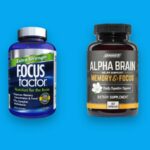
Table of Contents
Introduction
As a nootropic expert with years of experience, I’ve spent countless hours researching and experimenting with different supplements to enhance cognitive function. One of the most interesting and promising supplements I’ve encountered is phosphatidylserine.
Phosphatidylserine, or PS for short, is a phospholipid that plays a critical role in maintaining the structure and function of cell membranes in the body. It’s particularly abundant in the brain, which involves processes such as cell signalling, neurotransmitter production, and energy metabolism.
As someone who values mental clarity and focus, I was immediately intrigued by the potential benefits of PS for brain health. After diving deeper into the research and trying out PS supplements, I’m convinced it’s a powerful tool for improving cognitive function and overall well-being.
In this blog post, I’ll share everything you need to know about PS as a nootropic, including its benefits, risks, and recommended dosages. We’ll explore the science behind PS, its potential benefits for brain health, and how to choose the right PS supplement for your needs.
What is L-Tyrosine?
L-Tyrosine is a non-essential amino acid that is naturally produced in the body from another amino acid called phenylalanine. It’s found in various high-protein foods, including meat, dairy, and eggs.
What makes L-Tyrosine unique is its role in the production of several important neurotransmitters, including dopamine, Norepinephrine, and epinephrine. These neurotransmitters play critical roles in regulating mood, energy, and focus, making L-Tyrosine a potential nootropic for cognitive enhancement.
When we consume L-Tyrosine, our body converts it into L-DOPA, which is converted into dopamine. Dopamine is often referred to as the “feel-good” neurotransmitter, as it’s involved in feelings of pleasure, motivation, and reward.
On the other hand, Norepinephrine and epinephrine are involved in the body’s stress response. They help increase heart rate, blood pressure, and respiration in response to stressors, which can help us stay alert and focused in challenging situations.
While our body can produce L-Tyrosine alone, supplementing with L-Tyrosine can help support healthy levels of these important neurotransmitters. This can lead to improvements in mood, focus, and stress management, among other potential benefits.
It’s also worth noting that L-Tyrosine is involved in the production of thyroid hormones, which regulate metabolism and energy levels in the body. So this is yet another way that L-Tyrosine may be interested in supporting overall health and well-being.
One thing to remember is that not all forms of L-Tyrosine are created equal. Several different types of L-Tyrosine supplements are available, including free-form L-Tyrosine, N-acetyl L-Tyrosine (NALT), and L-Tyrosine bound to other compounds.
Free-form L-Tyrosine is the most common and widely available form. Still, it may not be as bioavailable as other forms. NALT, on the other hand, is a more stable and bioavailable form of L-Tyrosine that may be more effective at crossing the blood-brain barrier and increasing dopamine levels in the brain.
L-Tyrosine bound to other compounds, such as magnesium or zinc, may also be more bioavailable and effective than free-form L-Tyrosine. Therefore, it’s important to research and chooses a high-quality L-Tyrosine supplement that’s right for your individual needs.
The recommended daily dose of L-Tyrosine ranges from 500-2000 mg per day, depending on the individual and their goals. It’s best to start with a lower dose and gradually increase it over time to assess tolerance and effectiveness.
While L-Tyrosine is generally safe and well-tolerated, it’s important to speak with your healthcare provider before adding it to your regimen, especially if you have a history of thyroid or adrenal gland problems.
In summary, L-Tyrosine is a naturally occurring amino acid that plays a critical role in producing several important neurotransmitters and thyroid hormones. Supplementing with L-Tyrosine may benefit cognitive function, mood, stress management, and overall well-being. Choosing a high-quality L-Tyrosine supplement and speaking with your healthcare provider before use are important.
Benefits of L-Tyrosine
As a nootropic enthusiast, I’m always looking for natural supplements that can help boost cognitive function and overall well-being. L-Tyrosine is one such supplement that has caught my attention thanks to its potential benefits for the brain and body.
Here are some of the potential benefits of L-Tyrosine:
Improved mood and stress management: As I mentioned earlier, L-Tyrosine is involved in producing several important neurotransmitters, including dopamine, Norepinephrine, and epinephrine. These neurotransmitters play key roles in regulating mood and stress response. Therefore, supplementing with L-Tyrosine may help support healthy levels of these neurotransmitters, leading to improved mood, motivation, and stress management.
Enhanced cognitive function: L-Tyrosine has also been studied for its potential cognitive benefits. One study found that supplementing with L-Tyrosine improved cognitive flexibility and working memory in healthy adults. Another study found that L-Tyrosine supplementation improved cognitive function in military personnel during a stressful training scenario.
Increased alertness and focus: L-Tyrosine may also help improve alertness and focus, particularly in stressful or challenging situations. One study found that L-Tyrosine supplementation improved cognitive performance and reduced the negative effects of stress in sleep-deprived individuals.
Thyroid Support: L-Tyrosine produces thyroid hormones, which play a critical role in regulating metabolism and energy levels in the body. Supplementing with L-Tyrosine may help support healthy thyroid function and energy levels.
Exercise performance: L-Tyrosine may also have potential benefits for exercise performance. One study found that supplementing with L-Tyrosine improved cycling performance and reduced perceived exertion in trained cyclists.
It’s important to note that while these potential benefits of L-Tyrosine are promising, more research is needed to understand its effects on the body and brain fully. Therefore, it’s also important to choose a high-quality supplement and speak with your healthcare provider before adding L-Tyrosine to your regimen, especially if you have a history of thyroid or adrenal gland problems.
Forms of L-Tyrosine Supplements
Regarding supplementing with L-Tyrosine, there are a few different forms available. Here are some of the most common forms of L-Tyrosine supplements:
Capsules: L-Tyrosine capsules are popular for supplementing this amino acid. Capsules are convenient, easy to take, and usually in standardized doses.
Powder: L-Tyrosine powder is another option and is often preferred by those who want more flexibility in dosing. The powder can be added to drinks or smoothies or mixed with food.
Tablets: L-Tyrosine tablets are similar to capsules, but maybe a better choice for those who have difficulty swallowing capsules.
Sublingual: Sublingual L-Tyrosine supplements are designed to be taken under the tongue and absorbed directly into the bloodstream. This can lead to faster absorption and potentially more rapid effects.
Combination products: L-Tyrosine may also be included as an ingredient in combination products, such as nootropic blends or pre-workout supplements.
When choosing an L-Tyrosine supplement, it’s important to look for a high-quality product from a reputable manufacturer. In addition, look for supplements that are third-party tested for purity and potency, and avoid products that contain unnecessary fillers or additives.
It’s also important to consider dosage when supplementing with L-Tyrosine. While there is no established recommended daily intake for L-Tyrosine, most supplements come in 500-1000 mg doses. Therefore, starting with a lower dose and gradually increasing as needed is recommended, and speaking with your healthcare provider before starting any new supplement regimen is recommended.
Overall, L-Tyrosine is a promising natural supplement with potential benefits for mood, cognitive function, and exercise performance. With the variety of forms available, it’s easy to find a supplement that works for your individual needs and preferences.
Risks and Side Effects
While L-Tyrosine is generally considered safe, there are some potential risks and side effects.
First and foremost, it’s important to note that L-Tyrosine supplements should not be used as a substitute for prescription medications, particularly those used to treat mental health conditions. If you are currently taking prescription medication, you must speak with your healthcare provider before adding any new supplements to your regimen.
In addition, some people may experience mild side effects when supplementing with L-Tyrosine. These can include nausea, headaches, and digestive upset. These side effects are generally mild and go away on their own. Still, if you experience severe or persistent symptoms, you must speak with your healthcare provider.
There is also some concern that high doses of L-Tyrosine may increase the risk of thyroid dysfunction, particularly in individuals already prone to thyroid issues. For example, suppose you have a history of thyroid problems or are currently taking medication to treat a thyroid condition. In that case, it’s essential to speak with your healthcare provider before supplementing with L-Tyrosine.
Finally, it’s important to consider the source and quality of the L-Tyrosine supplement you choose. Some supplements may be contaminated with harmful substances or may not contain the amount of L-Tyrosine listed on the label. To minimize the risk of contamination, choose supplements from reputable manufacturers who undergo third-party testing for purity and potency.
Overall, while L-Tyrosine is generally considered safe and well-tolerated, it’s important to speak with your healthcare provider before starting any new supplement regimen. By doing so, you can ensure that you are taking the appropriate dose and minimizing the risk of potential side effects.
Conclusion
In conclusion, L-Tyrosine is a naturally occurring amino acid that plays a key role in producing neurotransmitters like dopamine and Norepinephrine. Therefore, supplementing with L-Tyrosine may improve cognitive function, reduce stress, and enhance athletic performance.
However, it’s important to remember that L-Tyrosine supplements should not be used as a substitute for prescription medications, particularly those used to treat mental health conditions. Additionally, knowing the potential risks and side effects associated with L-Tyrosine supplementation is important and speaking with your healthcare provider before starting any new supplement regimen.
If you’re looking for a natural way to support cognitive function, reduce stress, or enhance athletic performance, L-Tyrosine may be worth considering. By choosing a high-quality supplement from a reputable manufacturer and working with your healthcare provider to determine the appropriate dosage, you can safely and effectively incorporate L-Tyrosine into your health and wellness routine.
References
Here are some of the sources I used to write this blog post:
Colzato, L. S., et al. “Effect of tyrosine supplementation on clinical and healthy populations under stress or cognitive demands-A review.” Journal of psychiatric research 47.9 (2013): 1419-1428.
Fernstrom, John D., and Madelyn H. Fernstrom. “Tyrosine, phenylalanine, and catecholamine synthesis and function in the brain.” Journal of Nutrition 137.6 (2007): 1539S-1547S.
Jongkees, Bryant J., et al. “Effect of tyrosine supplementation on clinical and healthy populations under stress or cognitive demands-A review.” Journal of psychiatric research 70 (2015): 50-57.
Shurtleff, David, et al. “Tyrosine reverses a cold-induced working memory deficit in humans.” Pharmacology Biochemistry and Behavior 47.4 (1994): 935-941.
University of Michigan Medicine. “Tyrosine.” Accessed February 19, 2023. https://www.uofmhealth.org/health-library/hn-2186009.
Yamamoto, Takashi, et al. “Effects of acute tyrosine administration on cerebral blood flow and working memory in healthy adults.” Journal of Neural Transmission 118.10 (2011): 1473-1481.
I hope you find these sources helpful and informative!








